At our Chair of Clinical Psychology, we research the causes and treatment options for mental disorders. Among other things, we are investigating how anxiety and pain arise in the body, why psychological complaints affect us and why we can feel cut off from the world after severe trauma. But we also look at the very joyful aspects of social interaction. These include, for example, the sweet smell of our babies or the embrace of our friends and partners. Such stimuli are processed in so-called reward areas of the brain and lead to the fact that we enjoy being in the company of our loved ones and that we experience closeness.
For the Long Night of Science, we cordially invite you to learn more about yourself, your fellow human beings and human experience and behavior at the Chair of Clinical Psychology. We have prepared a colorful hands-on program.
I can't smell that... Or can I? Experiments, questionnaires and much more on the subject of "smell"
Our "smelling station" is all about smells, how we perceive them and how they influence our behavior. Find out how good your sense of smell is, play smell memory and make your own (non-alcoholic) cocktail - not by ingredient, but by the smells of the ingredients! Come and talk to our researchers about how we perceive body odors, how the smell of our children changes during puberty and what happens to our body odor when we fall ill.
The perception of pain
Most people probably agree on one thing: pain is unpleasant. But why do we feel pain? How does pain arise and why do some people feel pain under certain conditions and others do not? Researching such phenomena is not easy and is subject to many rules to protect the people involved. At our "pain station" you can get a taste of pain research. You can try out for yourself when you personally start to feel slight pain and how you differ from other people.
What about you?
In our social interaction station, we investigate what makes a good conversation. What actually happens when two people feel like they could go on talking endlessly? How does that make us feel and what does our body do? We invite you to have a short conversation with your friends and strangers, which we will then analyze with you using video analysis.

